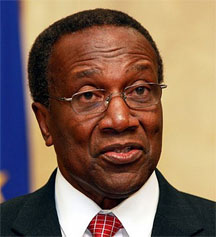Some time this year, Caribbean heads of government will appoint a new Caricom Secretary General. Their choice will demonstrate how strong or weak an institution they require and whether they want change. As matters stand there are a relatively small number of names under consideration to succeed Sir Edwin Carrington, but none it would seem of like stature.
The process comes against a background of ever louder concern expressed by academics, commentators, business leaders, statesmen and former political figures, who are alarmed by the failure of the regional project to move forwards, and worried by the inability or unwillingness of governments to implement what is agreed. In public and in private they level an often devastating critique at the failure of the politicians to build on the promise the region exhibited a decade or more ago.
Most notably they are highly critical of the region’s failure to complete the Caribbean Single Market and Economy (CSME). They criticise Caricom governments and institutions for not ensuring the capacity and economic strength necessary to create a sound regional economic base for investment and trade, the effect of which, they argue, has been to allow the smaller economies of Latin America to overtake the region and become more competitive, just as every last vestige of ACP preference is eroded.

And they express the view that by countries distancing themselves from regional institutions such as the Caribbean Court of Justice, the underpinning and consensus necessary for regional economic integration to succeed, is fading away.
There is also a school of thought that blames the absence of new thinking and new solutions on Caribbean economists who it is suggested have continued to believe that history and anyone other than the Caribbean is to blame for the crisis that the region faces.

Recently, Sir Ronald Sanders, writing about these issues suggested that the time had come to stop playing with the aspirations of the Caribbean people. He argued that Caricom needed to devise urgently a comprehensive regional plan utilising the best Caribbean brains that can be assembled from inside and outside of the region. Space does not allow me to do justice to what he wrote, but in part he proposed that such a plan might integrate production in a practical manner utilising resources from every country that has them, facilitate cross border investment, and encourage regional amalgamations of productive enterprises.
Sir Ron is right. There is desperate need for a commission with popular support to be empowered to make recommendations on how to move forwards and modernise Caricom. However, for such an approach to have any chance of success, Caribbean governments have to be committed to delivering whatever is recommended, and they need to have appointed a Secretary General who thinks in this way.
This is not to be critical of the achievements of the outgoing Secretary General. Nor is it to ignore the realpolitik of managing small economies during a global economic crisis, or to ignore the unusual constraints on prime ministers trying to find national solutions while trying to deliver regional policies. Rather it is to suggest that without the will on the part of the Caribbean’s political directorate to establish a body that is able to implement rather than co-ordinate and advise, further progress towards the CSME is unlikely.
The fear is that it may now be too late for change. Regional integration was a characteristic more likely to emerge successfully from the tensions of the Cold War, when there was a consensus that there was a need to build stronger economic blocs and a willingness on the part of external actors to support this through trade and development policies. That time has passed and the region failed to take advantage of what was on offer. And while there is still a genuine desire for regionalism to succeed, the economic and political cost of achieving this in parallel to a recession and market opening may now be thought to be too high.
Unfortunately, external events that require a regional response are becoming more acute. In the last few days, for example, the United Nations Food and Agriculture Organisation has made clear that the world is facing a new economic crisis as food and energy prices surge. This is an issue on which the region has been moving at a snail’s pace. The process of designing a policy on regional food security has been underway for years but is now rapidly being overtaken by events.
Structural changes are taking place globally that will increase permanently food and energy prices in ways that will cause the regions US$3 billion plus food import bill and related transport costs to soar and become a drag on economic recovery. This will happen at just the moment that some developed economies, the main feeder markets for Caribbean tourism, face difficulties for much the same reasons in achieving past levels of growth.
While Caricom has produced and posted on the web an excellent, detailed and far-sighted report on what is required to increase regional food production and supply, heads of government have yet to consider this, and even then Caricom has no locus to ensure what is agreed actually happens.
In selecting a new Secretary General, and determining her or his role, Caricom heads will indirectly demonstrate whether the CSME has a future or whether they are content with drift and the emergence of a region of cross cutting extra-regional and sub-regional and relationships. The probability is that as with so much before, the issue will be fudged; there will be no interest in a practical new governance structure; there will be cuts in funding; and the spectre of tension and distrust will grow.
Previous columns can be found at www.caribbean-council.org





